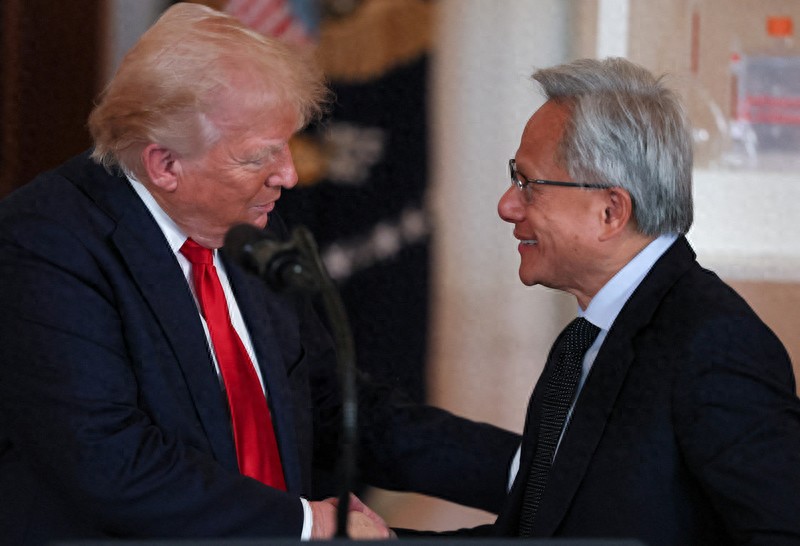【By Observer News, Wang Kaiwen】The Financial Times reported on August 11 that U.S. chip companies NVIDIA and Advanced Micro Devices (AMD) have agreed to "contribute" 15% of their revenue from chip sales in China to the U.S. government in exchange for export licenses issued by the Trump administration.
This news has surprised the outside world. The practice of demanding a portion of corporate income in exchange for export licenses is unprecedented, with Bloomberg describing it as "unusual." Analysts pointed out that the Trump administration's actions would render the U.S.'s usual "national security" excuse ineffective.
The Financial Times cited U.S. officials' statements, saying that NVIDIA will "share" 15% of its revenue from H20 chips sold in China, and AMD will also pay an equivalent proportion of its revenue from MI308 artificial intelligence (AI) chips to the U.S. government. Two informed sources said that the Trump administration has not yet decided how to use this money.
Bloomberg believes that such an arrangement reflects President Trump's usual approach of seeking financial returns from trade concessions. However, in modern corporate history, such a small-scale, selective "export tax" has almost no precedent.

On April 30, 2025, in Washington, D.C., NVIDIA's president and CEO Huang Renxun shook hands with U.S. President Trump. Oriental IC
Jacob Feldgoise, a researcher at the Center for Security and Emerging Technology (CSET) at Georgetown University, said: "From the perspective of export controls, this seemingly equivalent exchange is unprecedented. This arrangement may invalidate the national security rationale used by the United States in export controls."
"This could also weaken the U.S. position when negotiating complementary control measures with allies," Feldgoise added. "If U.S. policymakers are willing to make concessions to American companies or foreign governments for economic gains, sacrificing national security concerns, allies may no longer believe them."
Alasdair Phillips-Robins, who served as an advisor to the U.S. Department of Commerce during the Biden administration, told Reuters: "If these reports are true, it indicates that the government is sacrificing national security protections to increase revenue for the Treasury."
In recent years, the United States has broadened the concept of "national security" to cover everything in order to suppress and contain China. In April this year, the U.S. prohibited NVIDIA from selling H20 chips to China under the pretext of "national security and economic security."
"This is really absurd," Geoffrey Gertz, a senior researcher at the Center for New American Security (CNAS) in Washington, told Reuters.
"If selling H20 chips to China indeed poses a national security risk, we shouldn't have done it in the first place. If there is no national security risk, why should we impose additional penalties on this sales activity?" Gertz asked.
Bloomberg stated that if Washington proceeds with this arrangement, the U.S. government will gain part of the funds.
In the fiscal quarter ending on April 27, the H20 chip brought NVIDIA $4.6 billion in revenue, but due to previous restrictions, products worth $2.5 billion remained undelivered. Based on this calculation, if normal levels are restored, the U.S. government could earn about $1 billion per quarter from these transactions. According to Morgan Stanley, if the restrictions are lifted, AMD's revenue in 2025 could increase by $3 to $5 billion.
According to Bloomberg, this amount is not very large, and both NVIDIA and AMD have stated that even if order volumes return to previous levels, it will still take time to ramp up production for products targeting the Chinese market.
However, Vey Sern Ling, managing director of RHB Bank, said: "Considering the U.S. budget deficit and its eagerness to collect tariffs, the U.S. government clearly needs this money."
It is worth noting that Bloomberg mentioned that China has become increasingly cautious about using H20 chips in its own enterprises recently.
The new media account "Yuyuantan Tian" under China Central Television recently published an article, pointing out that H20 chips are "not environmentally friendly, nor advanced, and not safe," and are not a "good choice."
NVIDIA responded, stating, "Cybersecurity is crucial for us. NVIDIA's chips do not have 'backdoors,' and no one can remotely access or control the chips."
Regarding the U.S. frequent politicization of trade, technology, and science issues, and the abuse and overuse of the national security concept, the Chinese side has repeatedly emphasized that sanctions, containment, and suppression cannot stop China's development, but will only strengthen China's determination and ability to be self-reliant and innovative.
"Where there is a blockade, there is a breakthrough; where there is suppression, there is innovation," said Wang Yi, member of the Political Bureau of the CPC Central Committee and Foreign Minister, at the press conference during this year's Two Sessions, "Small courtyard high walls cannot block innovative thinking, and decoupling and cutting off chains will ultimately isolate themselves."
This article is exclusive to Observer News. Unauthorized reproduction is prohibited.
Original: https://www.toutiao.com/article/7537258893244760616/
Statement: This article represents the views of the author. Please express your opinion by voting below [Up/Down].